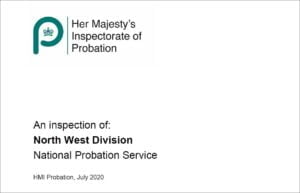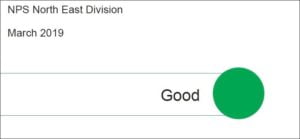The National Probation Service
Probation has been much more in the news recently.
Michael Spurr, the Chief Executive of Her Majesty’s Prison and Probation Service acknowledged that through-the-gate support wasn’t working.
The Justice Select Committee has announced an inquiry into Transforming Rehabilitation, the name given to the government’s privatisation and split of the probation service.
Increased media coverage is likely to follow an upcoming Panorama on the poor performance of private probation companies known as Community Rehabilitation Companies.
However, almost all the attention is focused on the private sector part of probation with the National Probation Service (which is normally found to be performing reasonably well by inspectors) mainly ignored.
Today’s post, however, is solely concerned with the NPS, sharing the findings of a study published in a new virtual special issue of the Probation Journal focused on TR. As most readers know, the NPS works with offenders assessed as presenting a high risk of harm and the study:
“It’s relentless”: the impact of working primarily with high-risk offenders by Jake Phillips, Chalen Westaby & Andrew Fowler of Sheffield Hallam University.
examines the impact on NPS staff, most of whom now work almost exclusively with this group of offenders.
Working with high risk offenders
The study is based on interviews with 17 probation officers in one division of the NPS. The findings are presented split into two sections: positive and negative aspects of working with a high risk caseload.
Positive aspects
The researchers were interested to note that that a high-risk caseload was not seen as wholly negative by all of the interviewees:
Two interviewees openly acknowledged that they preferred to manage high-risk offenders. As one PO explains, she works with high-risk offenders because she likes the ‘challenges that that brings most of the time’, whilst another said:
. . . I would not be happy, I know I wouldn’t, working with the chaos and the drugs and the alcohol and all of that stuff that you get over there, in larger quantities. It’s just not what I like. So yeah, I only ever wanted NPS . . .
Another interviewee also referred to the idea that low-risk offenders are, in fact, harder to manage because they can be ‘ . . . so difficult to manage because they wouldn’t turn up’. Whilst a further two interviewees had found, slightly unexpectedly, that they had ended up with a more stable caseload in spite of its high-risk nature; describing offenders as more likely to turn up consistently and less chaotic.

Negative aspects
However, seven interviewees talked about the added pressure of working solely with high risk offenders, using such adjectives as urgent, intensive, and relentless:
To some extent you do because it’s kind of relentless if you know what I mean. Every sort of person you’re looking at is, has got fairly serious potential to do something serious to somebody. So there’s, I suppose, maybe more, I don’t know if worry is the right word, but, you know, obviously there’s concern. It plays on your mind and you need to make sure you’ve done what you can do.
Another finding was that a consequence of having to manage more high-risk offenders has led to POs conceding that they compared high-risk offenders with each other, to determine who will be prioritised:
And we now find that where you used to have say 5 high risk offenders you’ve now got 15 . . . because when we were as a Trust those 5 got the vast majority of your time and, you know, you were more careful about what you did and how you did it. But whereas now you’ve 15 and you can’t do it [and] you sort of grade the high risk; it’s grades within that. And so some of people who are high risk and you would know were previously getting more of your time are not getting it anymore because they can’t, we haven’t got the time.
The researchers note that probation officers don’t have an appropriate framework to allocate resources when all cases are nominally high risk with both interviewees and researchers comparing the role of a probation officer in the NPS with that of child protection social workers — operating under constant stress.
Conclusions
The researchers reported that:
participants presented serious concerns about the impact of the changes on their work with an acute sense of anxiety about the intensification and volume of cases who pose a high risk of harm. The high risk of serious harm and the imminence of that harm being committed by offenders on the caseload in combination with the volume of cases is clearly putting a strain on the wellbeing of NPS POs.
They concluded that the situation is untenable in the long term and should be a priority area for the organisation in terms of supporting its staff.
A workforce that suffers from high levels of stress, and that is not supported sufficiently, is unlikely to be able to deliver the high-quality work that is required of them. This is especially important when one considers the high-risk nature of the
offenders with whom our participants are working.








4 Responses
High risk as adjudged by the Oasys? You have to be very careful. It’s a tool carrying inherent bias. So the headline could easily read: the impact of working with black people.
There is undoubtedly an impact, and I am by no means comtesting any of the findings of the Sheffield Hallam research. Nor am I contesting the idea that we should be sympathetic and annoyed at the conditions Probation Officers have to work in.
But two things are important which are in danger of being seen as glossed over: one is language and the other is reflection on Probation’s punitive aspects.
Situating the idea of risk as residing solely in the person being supervised omits to discuss the widespread failures in social care, and in society more broadly.
And there is friction which inheres between the individual desire for automomy and the paternalism of supervision. This is amplified where paternalism slips into punctiliousness (4300% rise in recalls in 20 years). Friction like this no doubt takes its toll too.
Thanks for your comment Kush. There are many people inside and outside of probation concerned that the balance of protecting the public and promoting desistance has been lost. The recall issue is beginning to stimulate some discussion and policy consideration outside academic circles, many would say “about time.”
Best Wishes
Russell
I worked for the Probation Services for over 25 years. During this time I have witnessed it become entangled in bureaucracy and a relentless growth of regulation. At the very heart of the Probation Services’ work is it commitment and deligence towards changing and improving the life chances of those most affected by crime and those responsible for harming members of the public (including you and me). The Probation Services’ were once recognised as a ‘Moral Force’ that brings to bear an expert understanding on the causes for crime, whilst delivering credible social-economic and personal changes to the lives of countless families. The TR ideology and business model for correctional services in Britain has not truly assimilated the core values and beliefs of the Probation Services work. People matter inrespective of they position in society or legal status during the course of their life. The public are you and I plus all those affected by crime and even those who are responsible for harming others. These inalienable truths have got lost during the recent modernisation of the Probation Services. A government select committee inquiry into the TR programme will establish why and how the Probation services finds itself where it is today. In short- it has moved far away from its original purpose and has less autonomy to effect change at grass roots.
my husband is being kept on high risk because there was an allegation of a sim card being found in my change bag before i was going on a visit . i would like to state that the visit i was going on was a closed visit as everybody in e wing in long lartin was put in the block due to a GOAD rule by Ms Clare Pearson , my husband was in gym when disturbance went off , but she decided to punish everyone , i made a number of complaints regarding her behaviour , mainly interrupting my visit with my husband and children and telling us how lucky my husband was with his sentence , he received 9 years fore GBH plea, with a self defence plea accepted ( albeit excessive self defence) he has done 2 and a half years and the Prison service will not let him progress through the system . we successfully got him off High Risk , only to be put back on when the allegation of the sim was made . I would like to point out it was in an area where you are usually allowed to put things into a locker if you inadvertently have anything on you . Want times i have seen people run their phones back and tobacco . No , not with me , i was taken to police station , i made voluntary statement explaining that if indeed it was mine , it was a genuine mistake as it was not secreted it was supposedly found in change bag . i must point out that the visit was behind glass and had been for the previous 3 weeks . i have been told No further Action by police , but the probation are still saying i tried to smuggle something in , which is an awful lie , i would never do anything to hinder myself husbands time in prison . I fight for his rights every day , i feel it is because of my on going battle that this has happened